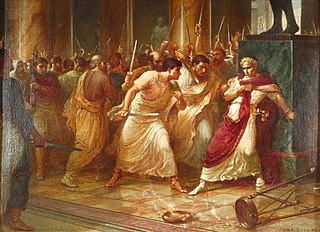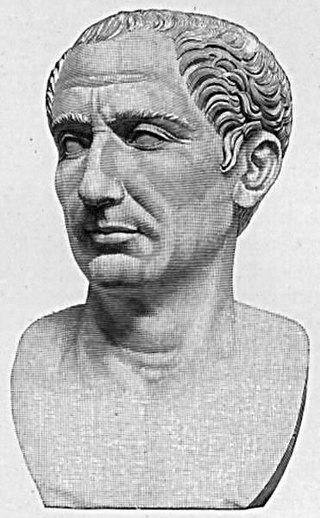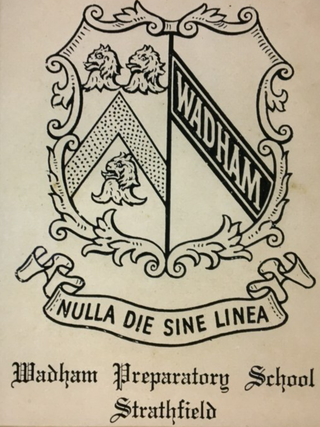Related Research Articles

Latin is a classical language belonging to the Italic branch of the Indo-European languages. Considered a dead language, Latin was originally spoken in Latium, the lower Tiber area around Rome. Through the expansion of the Roman Republic it became the dominant language in the Italian Peninsula and subsequently throughout the Roman Empire. Even after the fall of Western Rome, Latin remained the common language of international communication, science, scholarship and academia in Europe until well into the 18th century, when regional vernaculars supplanted it in common academic and political usage. For most of the time it was used, it would be considered a dead language in the modern linguistic definition; that is, it lacked native speakers, despite being used extensively and actively.
A brocard is a legal maxim in Latin that is, in a strict sense, derived from traditional legal authorities, even from ancient Rome.

Apelles of Kos was a renowned painter of ancient Greece. Pliny the Elder, to whom much of modern scholars' knowledge of this artist is owed, rated him superior to preceding and subsequent artists. He dated Apelles to the 112th Olympiad, possibly because he had produced a portrait of Alexander the Great.
Sic semper tyrannis is a Latin phrase meaning "thus always to tyrants". In contemporary parlance, it means tyrannical leaders will inevitably be overthrown. The phrase also suggests that bad but justified outcomes should, or eventually will, befall tyrants. It is the state motto of Virginia.

Noli me tangere is the Latin version of a phrase spoken, according to John 20:17, by Jesus to Mary Magdalene when she recognized him after his resurrection. The biblical scene has been portrayed in numerous works of Christian art from Late Antiquity to the present. The phrase has also been used in literature, and later in a variation by military units since the late 18th century.

Carpe diem is a Latin aphorism, usually translated "seize the day", taken from book 1 of the Roman poet Horace's work Odes.
Sapere aude is the Latin phrase meaning "Dare to know"; and also is loosely translated as "Have courage to use your own reason", "Dare to know things through reason". Originally used in the First Book of Letters, by the Roman poet Horace, the phrase Sapere aude became associated with the Age of Enlightenment, during the 17th and 18th centuries, after Immanuel Kant used it in the essay "Answering the Question: What Is Enlightenment?" (1784). As a philosopher, Kant claimed the phrase Sapere aude as the motto for the entire period of the Enlightenment, and used it to develop his theories of the application of reason in the public sphere of human affairs.

Dulce et decorum est pro patria mori is a line from the Odes (III.2.13) by the Roman lyric poet Horace. The line translates: "It is sweet and proper to die for one's country." The Latin word patria (homeland), literally meaning the country of one's fathers or ancestors, is the source of the French word for a country, patrie, and of the English word "patriot".

Et tu, Brute? is a Latin phrase literally meaning "and you, Brutus?" or "also you, Brutus?", often translated as "You as well, Brutus?", "You too, Brutus?", or "Even you, Brutus?". The quote appears in Act 3 Scene 1 of William Shakespeare's play Julius Caesar, where it is spoken by the Roman dictator Julius Caesar, at the moment of his assassination, to his friend Marcus Junius Brutus, upon recognizing him as one of the assassins. The first known occurrences of the phrase are said to be in two earlier Elizabethan plays; Henry VI, Part 3 by Shakespeare, and an even earlier play, Caesar Interfectus, by Richard Edes. The phrase is often used apart from the plays to signify an unexpected betrayal by a friend.

The phrase "scientia potentia est" is a Latin aphorism meaning "knowledge is power", commonly attributed to Sir Francis Bacon. The expression "ipsa scientia potestas est" occurs in Bacon's Meditationes Sacrae (1597). The exact phrase "scientia potentia est" was written for the first time in the 1668 version of Leviathan by Thomas Hobbes, who was a secretary to Bacon as a young man. The related phrase "sapientia est potentia" is often translated as "wisdom is power".

"Fortune favours the bold" or "fortune favours the brave" are among the English translations for a like-minded Latin proverb that has many variations: Audentes Fortuna Iuvat. The core meaning of the phrase has been widely used as a slogan in the Western world to emphasize concepts of courage and bravery, particularly within military organizations, and it is also used up to the present day on the coats of arms of numerous individual families and clans. It has historically served as a popular motto for universities, along with other academic and recreational institutions.

The Farmer and the Viper is one of Aesop's Fables, numbered 176 in the Perry Index. It has the moral that kindness to evil will be met by betrayal and is the source of the idiom "to nourish a viper in one's bosom". The fable is not to be confused with The Snake and the Farmer, which looks back to a situation when friendship was possible between the two.
A Latin mnemonic verse or mnemonic rhyme is a mnemonic device for teaching and remembering Latin grammar. Such mnemonics have been considered by teachers to be an effective technique for schoolchildren to learn the complex rules of Latin accidence and syntax. One of their earliest uses was in the Doctrinale by Alexander of Villedieu written in 1199 as an entire grammar of the language comprising 2,000 lines of doggerel verse. Various Latin mnemonic verses continued to be used in English schools until the 1950s and 1960s.

Nuremberg Funnel is a jocular description of a mechanical way of learning and teaching. On the one hand, it evokes the image of a student learning his lessons with this kind of teaching method almost without effort and on the other hand, a teacher teaching everything to even the "stupidest" pupil. It can also reference forceful teaching of someone's ideas, ideology, etc.
National symbols of Poland are the tangible and intangible symbols, emblems or images that are found in Poland to represent the country's unique customs, traditions, cultural life, and its over 1000-year history. These symbols serve as the nation's portrayal of patriotism and dedication to their national identity. The Polish people and the Polish diaspora around the world take great pride in their native country, and associate themselves with the colours white and red. The expression biało-czerwoni ("whitereds") is widely used by Poles when referring to their compatriots. A crowned white-tailed eagle on a red shield or background has been Poland's national symbol and coat of arms since the Middle Ages. Other unofficial symbols feature visual personifications, music of Chopin, polonaise and mazurka dances, animals such as the European bison or the white stork, apples, red poppy flowers and religious insignia of the Roman Catholic church. Several have been popularised in recent years, notably the winged hussars.

Poems by Julius Caesar are mentioned by several sources in antiquity. None are extant.

Ne supra crepidam is a Latin expression used to tell others not to pass judgment beyond their expertise.

Wadham Preparatory School was an independent day, co-educational, preparatory school founded on Christian principles. The school was located at 9–11 Wallis Avenue Strathfield, New South Wales, Australia.

Sine Cerere et Baccho friget Venus, or Sine Cerere et Libero friget Venus, is a quotation from the Roman comedian Terence that became a proverb in the Early Modern period. Its simplest level of meaning is that love needs food and wine to thrive. It was sometimes shown in art, especially in the period 1550–1630, in Northern Mannerism in Prague and the Low Countries, as well as by Rubens.
"Après moi, le déluge" is a French expression attributed to King Louis XV of France, or in the form "Après nous, le déluge" to Madame de Pompadour, his favourite. It is generally regarded as a nihilistic expression of indifference to whatever happens after one is gone. Its meaning is translated by Brewer in the forms "When I am dead the deluge may come for aught I care", and "Ruin, if you like, when we are dead and gone."
References
- ↑ Apelli fuit alioqui perpetua consuetudo numquam tam occupatum diem agendi, ut non lineam ducendo exerceret artem, quod ab eo in proverbium venit. «D'ailleurs, c'était une habitude systématique d'Apelle, aussi occupé fût-il, de ne pas laisser passer un jour sans pratiquer son art en traçant une ligne, ce qui a donné lieu à un proverbe.»
- ↑ Polydorus Vergilius, Proverbiorum libellus, Venise, 1498, fol. 16r.
- ↑ Félix Gaffiot, Dictionnaire latin-français, p. 912, s. v. linea.
- ↑ Rosenkranz, J.K.F. (1866). Diderot's Leben und Werke (in German). p. 100. Retrieved 2021-09-11.
- ↑ "Karl Marx: Theory Among the Anglo-Saxons". www.marxists.org. Retrieved 2023-10-31.
- ↑ https://escribadesanescriva.weebly.com/meditations-with-st-escriva/in-laetitia-nulla-dies-sine-cruce
- ↑ ""Nulla dies sine linea"". La Libre Belgique (in French). 1 July 2005. Retrieved 2018-06-07.
- ↑ Paul Klee, Kein Tag ohne Linie, catalogue, Hatje Cantz, 2005.
- ↑ Étienne Boissier, Le trait comme ligne de conduite, 2008.